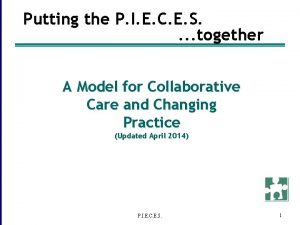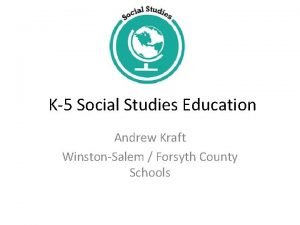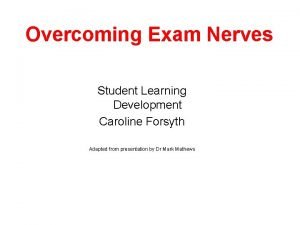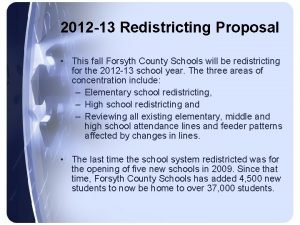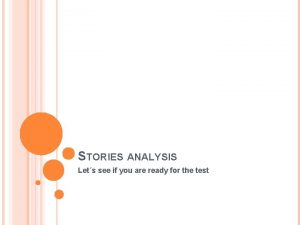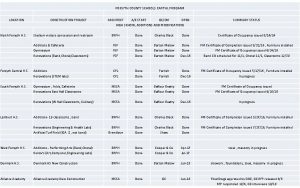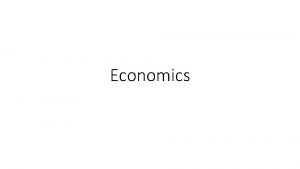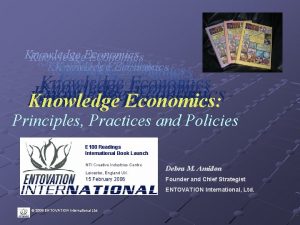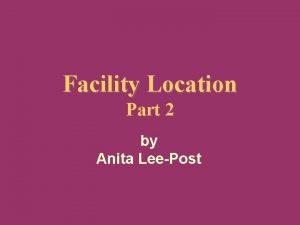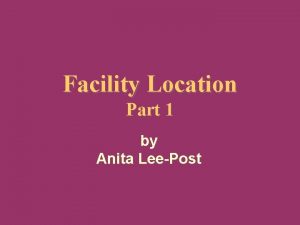Putting your case for Economics education Anita Forsyth
























- Slides: 24

Putting your case for Economics education Anita Forsyth Faculty of Education, Monash University Margaret Wilson Loreto Mandeville Hall

Why study Economics?

Why study Economics? (video) Qand. A session with students : *Year 9 and 10 s who do Commerce for 1 semester who have never done any Commerce before *Year 11 s and 12 s studying Economics

Why study Economics? . . . • • • From my students It’s so relevant It’s in the news every day Everyone needs to know about Economics Helps with life. . especially post school It’s not boring like many other subjects You learn many different skills-analysis, comprehension, mathematics, written & oral communication • It’s linked with many other subjects e. g. : History, Business Management, Politics, English, Maths, • Know we’ll need it when we work

VCE Economics data…. 2011 Year 11 Unit 2 Male 1807 1747 Female 815 727 TOTAL 2622 2474 Year 12 Unit 3 Unit 4 Male 1532 1503 Female 704 694 TOTAL 2236 2197

VCE Commerce subject enrolments in 2011 • • • Business Management-approx. 12, 400 Economics-approx. 2, 200 Legal Studies-approx. 8, 400 Accounting-approx. 5, 800 Politics-International & Australian-2000/390

Why Study Economics? The private rate of return to an Economics degree Philip Lewis, Anne Daly & Don Fleming*the Centre for Labour Market Research University of Canberra 2004 The decline in the number of students studying for and graduating in Economics degrees is well documented, as are the reasons for this decline (see, for instance, Lewis and Norris, 1997; Maxwell, 2003; and Milmow, 1995, 1997, 2000). The decline began to emerge in the early 1990 s at a time when university places as a whole began to expand rapidly. Among the reasons put forward for the decline was the growth of, and subsequent shift from Economics to Business degrees. In this paper, a Business degree refers to not only the generally described as BCom or BBus, but also the more specifically labeled degrees such as Bachelor of Marketing and Business Administration. Business degrees were (are) seen as more career focused and leading to higher paid jobs than economics. This image permeates down to high schools where students are taking easier subjects such as business studies and legal studies as tertiary entrance subjects. Other reasons for the decline relate to the nature of economics with many perceiving Economics to be too boring, abstract, mathematical or lacking interdisciplinary synergies.

Why study Economics…. revisited , 2006 • Updated research suggests some reasons to study Economics: – High rate of return on completing an Economics degree – Higher rate of return for male graduates (compared to Law and Business) – Law has higher returns for female graduates (compared to Economics and Business)

Girls & Economics- an unlikely coupling Alex MILLMOW & CHERYL BOOKALLIL School of Business, University of Ballarat *Freelance economic researcher Copyright 2006 The Economic Society of Australia ABSTRACT While total undergraduate enrolments at Australian universities are increasing, enrolments in Economics are falling—a source of alarm for economists. By appealing to females, economics could effectively tap into the largest sector (58%) of the undergraduate student population. This study suggests that gender is contributing to the falling enrolments. Males need the prospect of money to entice them to study more economics but females require a connection between studying economics and employment opportunities. Providing visible role models may be a practical step to encouraging more females to read economics. More concentration on 'feminising economics' in the undergraduate curricula could help women to believe that they have a contribution to make to the discipline.

Australian Curriculum- Economics & Business why? • Economics is about how we behave in the processes involved in everyday life • Prepares students for their various roles in lifegroundwork • Develops consumer & financial literacy • Integrated studies links an understanding of local, domestic, regional and global issues • Encourages enterprise, innovation, problem solving

Defining economics education – concepts and scope of economics education • Making choices/consumers and producers/resource allocation • Understanding economic behaviour and decisions • Work, enterprise and entrepreneurship - role of enterprise in building a prosperous economy • Economic, consumer and financial literacies • Economic reasoning and interpretation • Economics and the affective domain

Why Economics education? • For two minutes individually list 5 key issues currently on the agenda for Australia • Share your list with someone else nearby • Whole group sharing

Why Economics education? Did your list look something like mine? • • • New taxes – eg. carbon tax and its impact Rising price pressures, especially cost of utilities Footy grand finals Should we be obsessing about getting the budget back to a surplus? Is the mining boom over? The continuing high value of the $A The changing structure of the Australian economy – ‘two speed’ economy Ageing population Immigration/’boat people’/refugees Interest rates Continuing concerns about the stability of the world economy, etc. . .

Why Economics education? • Relevance! • Provides a framework for decision-making and making choices through cost/benefit analysis • Unique place in social sciences by answering the ‘why’ question related to issues, events and problems associated with other social sciences such as History and Geography • Active citizenship • Informs an understanding of your role as a consumer, producer, saver, investor, worker, entrepreneur, etc. . . • Informs understandings related to sustainability, social justice, ethical and social responsibility and values

Economics education and Melbourne Declaration • included as part of the humanities and social sciences learning area in the Melbourne Declaration on Educational Goals for Young Australians (2008) • informs the major changes that are happening in the world that are placing significant demands on Australian education including increasing global integration, globalisation and international mobility; need to nurture global citizenship; building a strong relationship with Asia; rapid and continuing advances in ICT and its impact; managing complex social, environmental and economic pressures.

Economics education and Melbourne Declaration • The Melbourne Declaration on Educational Goals for Young Australians (MCEETYA, 2008 pp. 8 -9) states that all young Australians should be ‘enterprising…make informed learning and employment decisions…work for the common good [and] are well prepared for their potential life roles as family, community and workforce members’.

Economics education and the Australian Curriculum • Australian curriculum draft shape paper – Economics and Business integrates Economics and Business and puts the case for the role and importance of including E & B in the curriculum.

Role for Economics in speaking to the general capabilities in Australian curriculum • • Literacy Numeracy Information and communication technology competence Critical and creative thinking Personal and social competence Ethical behavior Intercultural understanding.

Role for economics in speaking to the cross curriculum priorities in Australian curriculum • Aboriginal and Torres Strait Islander histories and • Asia and Australia’s engagement with Asia… Students will develop an appreciation of the economic, political and cultural interconnections that Australia has with the region. • Sustainability will allow all young Australians to develop an appreciation of the need for more sustainable patterns of living, and to build the capacities for thinking and acting that are necessary to create a more sustainable future.

Why Economics? • Economics is the perfect combination of numbers and words, problems and essays, calculations and interpretations. It is both an art and a science subject. http: //whystudyeconomics. ac. uk/blog/2012/03/the-benefitsof-studying-economics/

Why Economics? ‘Economic education is essential for active citizenship and for the creation of a well-functioning and informed democracy. It’s hard, if not to have any kind of meaningful debate on what government should or should not be doing without having a basic grasp of how markets work and of the tradeoffs involved in trying to meet unlimited wants with limited resources’. (CEE http: //www. councilforeconed. org/)

Why Economics? ‘The economy performs better when its participants are well informed, because well informed people make better decisions that enhance resource allocation, and thus contribute to rising efficiency, productivity and living standards. ’ ‘The economy will continue to get more complex. We are going to have multiple new products, new transactions. It’s going to become more global… we must make sure that people know what choices they are making and how to evaluate the information they are using to make those choices. ’ (CEE http: //www. councilforeconed. org/)

Why Economics? • Students who develop their economic literacy are in a better position to act rationally and ethically when making economic, consumer and personal financial decisions; to influence others to do likewise; to appreciate the complexity of economic decision-making and to better understand the economic decisions made by others. Not only can they manage their personal affairs better, they can be more effective and productive members of society as they are capable of making reasonable judgments on public policy issues that have a bearing on their personal prospects and those of the nation. David Dodge, Governor of the Reserve Bank of Canada, Toronto, 3 November 2003

Long live Economics Education! Comments/questions. . .
 Anita forsyth
Anita forsyth Putting the pieces together case study answer key
Putting the pieces together case study answer key Best case worst case average case
Best case worst case average case Anita regmi case
Anita regmi case The officer said to the clerk do it immediately
The officer said to the clerk do it immediately South forsyth high school pathways
South forsyth high school pathways South forsyth high school counselors
South forsyth high school counselors Wsfcs social studies
Wsfcs social studies Forsyth central swim and dive
Forsyth central swim and dive South forsyth parent portal
South forsyth parent portal Early college of forsyth
Early college of forsyth West forsyth high school wrestling
West forsyth high school wrestling Caroline forsyth
Caroline forsyth South forsyth high school ib program
South forsyth high school ib program Forsyth county redistricting
Forsyth county redistricting Mrs forsyth
Mrs forsyth Forsyth county graduation requirements
Forsyth county graduation requirements Televebin
Televebin Forsyth county schools overview
Forsyth county schools overview Forsyth child support
Forsyth child support West forsyth counseling
West forsyth counseling School of business and economics maastricht
School of business and economics maastricht Econ213
Econ213 Putting-out system
Putting-out system What is nasreen putting chocolate on?
What is nasreen putting chocolate on?

